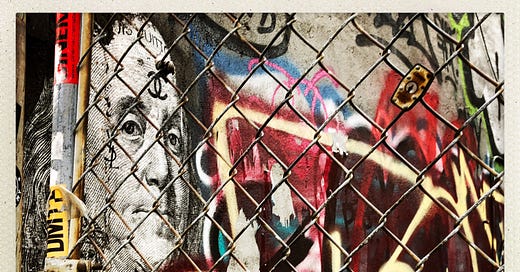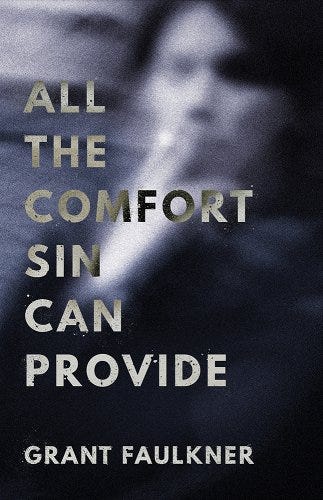Dear Readers,
We know that gratitude makes us happier and healthier. “Positive psychology” became a legitimate movement 15 years ago or so, and there have been umpteen psychological studies on gratitude, an entire industry of gratitude journals1, and then gratitude memes gush through the internet.
Some people now say we’ve gone too far, positing that positivity can be toxic in large doses—toxic because people feel undue pressure to be positive and the emphasis on positivity can diminish the legitimacy of feelings such as anger or melancholy.
Those points seem legit to me. Still, I like the idea of making gratitude a tangible and regular practice as a way to counterbalance the more negative sides of myself (sadly, I have a talent for complaint, which these past few years have especially nurtured).
I try to practice gratitude through daily writing, and then more informally as a way to get through a bad Monday morning (paying heed to my good fortune helps minimize all bad fortune). For the record, I am grateful for my melancholy (because gratefulness isn’t all sunshine and flowers).
I recently started to ponder a variation of my gratitude practice, the practice of delight. I stumbled on the “essayettes” of the poet Ross Gay, which he collected in The Book of Delights. Gay spent a year writing daily pieces about things that delighted him—nicknames, fireflies, bindweed, trusting people not to take your luggage on trains, anything.
When he started, he thought he’d have to be determined to find delight each day, but what he found was that delights began to stack up effortlessly (in fact, he has an essay titled “Stacks of Delights”).
“It didn’t take me long to learn that the discipline or practice of writing these essays occasioned a kind of delight radar. Or maybe it was more like the development of a delight muscle. Something that implies that the more you study delight, the more delight there is to study… I felt my life to be more full of delight. Not without sorrow or fear or pain or loss. But more full of delight. I also learned this year that my delight grows—much like love and joy—when I share it.”
He also found that so much of what inspired delight was interactions with others—that delight was a “sort of a manifestation of interdependence.”
Writing the book helped him clarify his objective as a writer: “to study joy, complicatedly.” I love how he added “complicatedly” because sometimes we think of joy or delight as being a pure impulsive response, an intense moment, but a joy can be as layered and nuanced and thorny as any other emotion. Interdependence is complex, so the joy it produces is complex.
Practicing delight sounds more fun than practicing gratitude to me—or a good addition to a gratitude practice—if only because practicing delight isn’t just a reflection, but more of an entire experience. In delight, you’re more with the object, creature, soul, or person you’re delighted by.
“Delight,” he tells us, means “out from light,” sharing etymological roots with delicious and delectable. This is a good way to write and to be—to draw things “out from light” in order to taste their deliciousness.
I’m going to try to write about a delight each day. I wonder how I’ll change as a writer and a person. I wonder how my “delight muscles” will develop.
Because the Museum of Endangered Sounds
Strange sounds are delightful, especially sounds from the past, sounds we’ve forgotten about: the sound of a rotary dial phone, the sound of static, the sound of Pac Man.
There are so many sounds that were once pervasive to the point of being background sounds, but they disappeared without us even noticing their passing.
Fortunately, they’re being collected in the Museum of Endangered Sounds. Take a listen. Especially if you grew up in the 70s and 80s.
Because essayettes
I love Ross Gay’s form of the “essayette,” an essay that is only a page or so. I’m obviously a creature of the short form—an enthusiast, an evangelist, a writer, editor, and publisher of all kinds of short stuff. What I like about the concept of the essayette is how it reinterprets the essay form and makes it more conducive to capturing the small moments of life. An essay doesn’t have to be 10 or 15 pages.
It reminds me of a form I discovered through Czeslaw Milosz—a Polish genre of short, alphabetically arranged entries. Milosz wrote ABC’s, a book that became a sort of reference book about his life, organized to the alphabet.
I began my own ABC book years ago, just as a way to jot down a paragraph or two about the odd things that have made up my life: detasseling corn, junior high school dances (slow dancing to songs by Bread), the drive-in theater, etc. Each entry is just an impression, a record, an essayette at most.
The roots of the word “essay” comes from the French “essai,” meaning to try, or to attempt. It’s such a humble name for a genre. It’s an invitation. I want to write more essayettes.
Because graffiti is a delight
Reminder: Dance like no one is watching.
Because time is a mother
This week’s featured writing video provides a poignant view into Ocean Vuong’s relationship to his mother and how that relationship related to his writing, even though she didn’t truly understand why he wrote or what he wrote.
All writers have stories of their parents’ reactions (or non-reactions) to their writing. Someone should publish an anthology of essays (and essayettes) about writers and their parents.
Because a haiku
The forest's job
—to talk deeply
and not check Twitter
Because it’s springtime
Short of actually going out into nature, the gifs created by Ilana Harris-Babou are a fun substitute. In her video collage, In Making Due, Harris-Babou presents imaginary correspondences from a character who has fled Brooklyn for the countryside during the Spring of 2020.
May the gifs of nature inspire real-life interaction. I hear nature is free.
Because a quote
“How tired I am of stories, how tired I am of phrases that come down beautifully with all their feet on the ground! Also, how I distrust neat designs of life that are drawn upon half sheets of notepaper. I begin to long for some little language such as lovers use, broken words, inarticulate words, like the shuffling of feet on the pavement."
—Virginia Woolf, The Waves
One interesting thing about being a writer is how we yearn for a language that goes beyond the language we have. Words never quite suffice, even the most beautiful of words.
Because a writing prompt
This comes from Sejahl Shah:
“Many essays, stories, and poems I’ve written are letters to people I have loved or people who haunt me—these are letters I am unable or unwilling to send. ‘Thank You,’ is one of those letters. Write a letter that you can never send or will never send—to someone with whom you are not in touch, or who has passed, or to whom the ability to speak at a certain level or pitch has faded. Who are the people who haunt you and what would you say that you never had a chance to say, if you could say it? A brief essay in the form of a letter, a direct address, a wish.”
All the Comfort Sin Can Provide
If you like this newsletter, please consider checking out my recently released collection of short stories, All the Comfort Sin Can Provide.
Lidia Yuknavitch said:
“Somewhere between sinister and gleeful the characters in Grant Faulkner’s story collection All the Comfort Sin Can Provide blow open pleasure—guilty pleasure, unapologetic pleasure, accidental pleasure, repressed pleasure.”
Grant Faulkner is executive director of National Novel Writing Month and the co-founder of 100 Word Story. He’s the author of Pep Talks for Writers: 52 Insights and Actions to Boost Your Creative Mojo and the co-host of the podcast Write-minded. His essays on creative writing have appeared in The New York Times, Poets & Writers, Lit Hub, Writer’s Digest, and The Writer.
For more, go to grantfaulkner.com, or follow him on Twitter at @grantfaulkner.
Gratitude journals now make up 13% of the U.S. Gross Domestic Product






Delight is an exquisite form of gratitude, more focused on the object than ourselves. This is my observation after a week of thinking about your piece. Great topic! Great job on the topic! It has actually moved the needle on my life.
I want that Ma Bell sound.